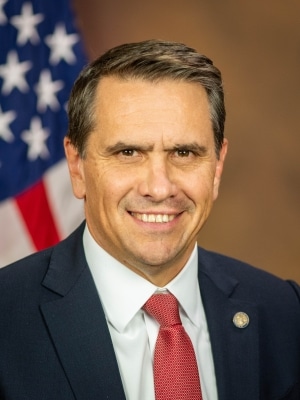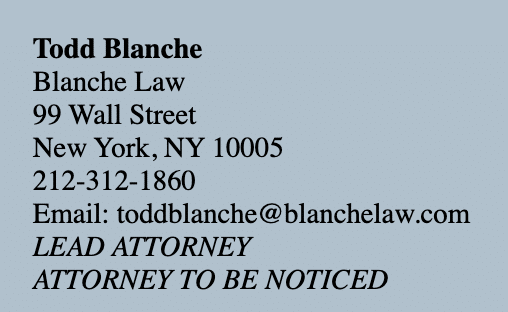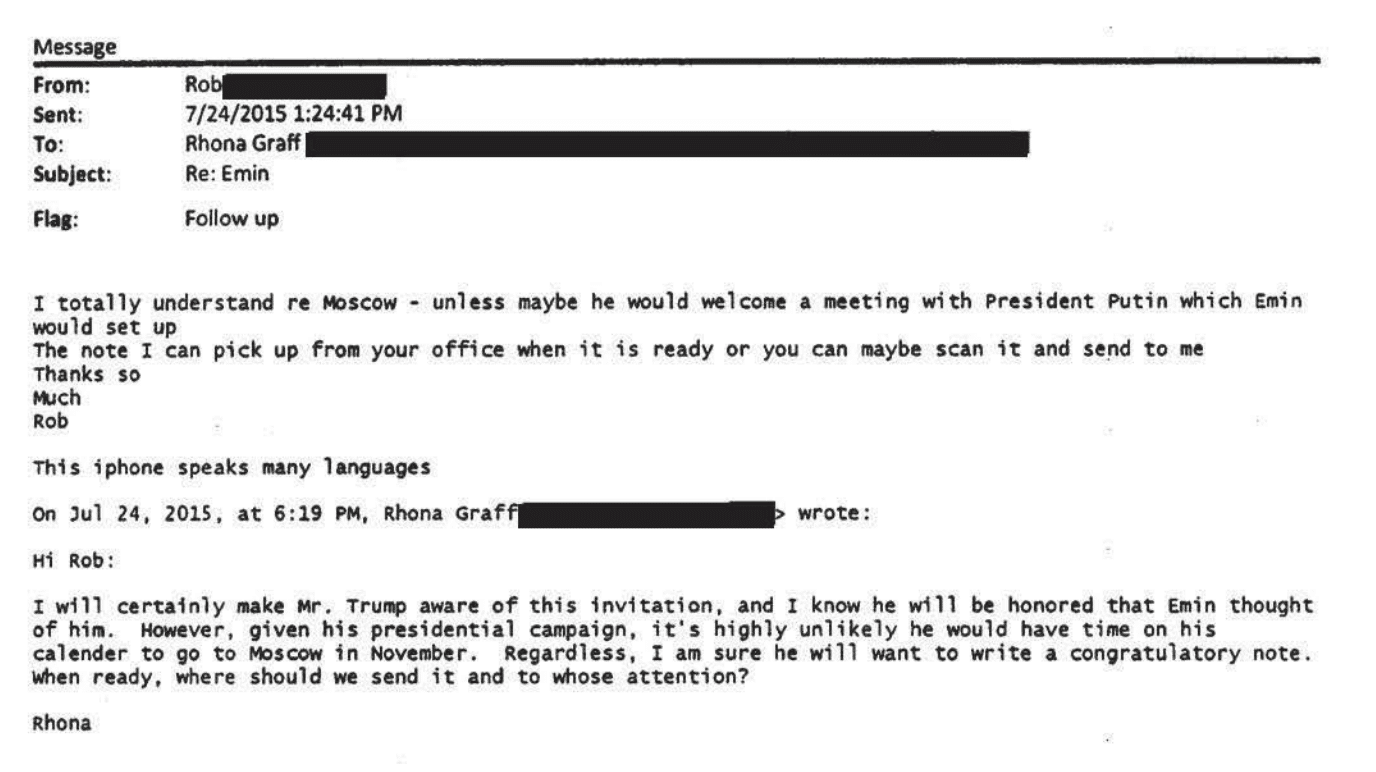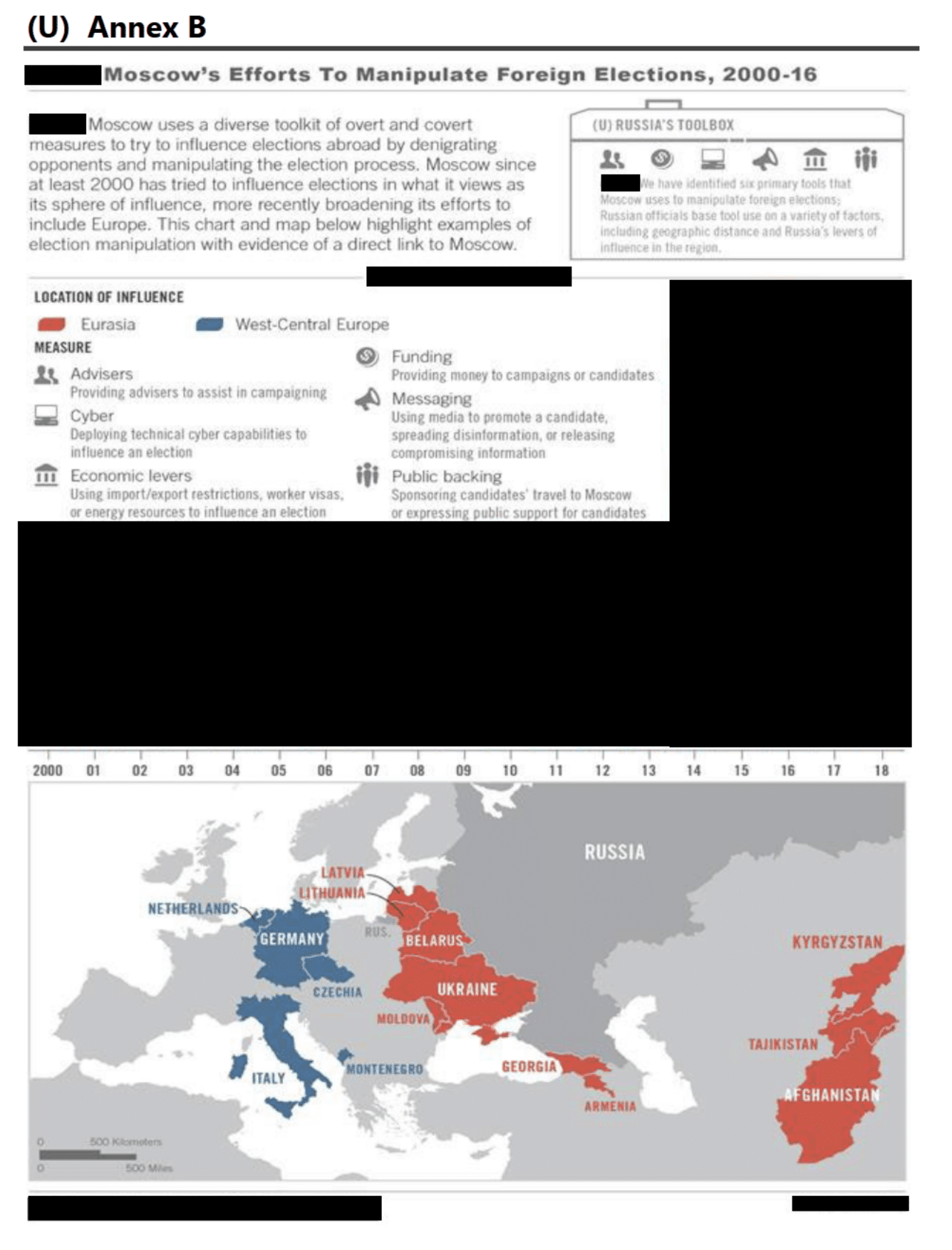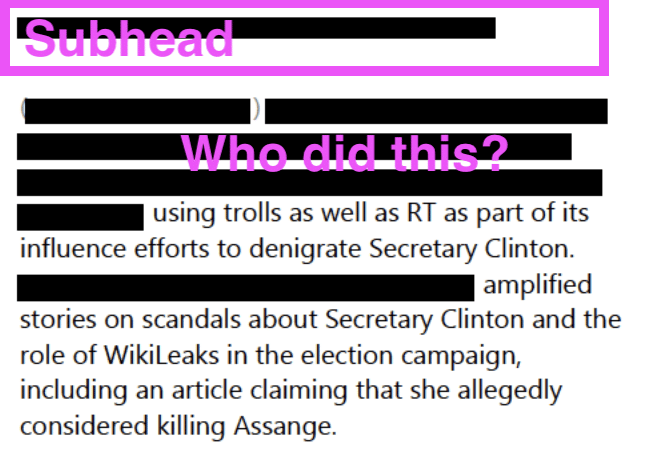Deep inside the story describing the letter hinting about sexual secrets that Trump wrote Jeffrey Epstein in 2003 — 26 paragraphs in — WSJ includes a seeming no comment from Ghislaine Maxwell.
Maxwell, a British socialite, was convicted in 2021 of helping Epstein’s sex-trafficking and sentenced to 20 years in prison. Maxwell didn’t respond to a letter requesting an interview sent to her in prison. Arthur Aidala, an attorney who represented Maxwell, said, “At this point, she is focused on her case before the Supreme Court of the United States.”
The reporters either had time to write Maxwell a posted letter or they are among the contacts Maxwell has listed to contact her via the prison email system (in any case, Trump would have no compunctions about tracking her communications in prison). Whichever means they used to contact her, they got got no response.
They also asked Arthur Aidala, who represented Maxwell — past tense — for comment. His response wasn’t so much a no comment, but was, instead, a claim that Maxwell is focused on her Supreme Court appeal — the appeal which she delayed until Trump was inaugurated, the appeal response to which John Sauer twice delayed, first from May until June, then from June until July, before finally submitting the response last Monday, July 14, just one day before WSJ interviewed Trump about the story. Aidala is not the attorney on that appeal; David Markus and Sara Kropf are the listed attorneys on her SCOTUS appeal. In fact, after Sauer submitted the response — indicating Trump’s DOJ would defend the prosecution after twice leaving open the possibility it might not — Markus told ABC that Trump probably didn’t know that Sauer — Trump’s one-time defense attorney — had done that, because Trump is the ultimate dealmaker.
In a statement Monday, an attorney for Maxwell hinted at the swirling controversy surrounding the Trump administration’s decision not to release any further records related to investigations of Epstein.
“I’d be surprised if President Trump knew his lawyers were asking the Supreme Court to let the government break a deal. He’s the ultimate dealmaker—and I’m sure he’d agree that when the United States gives its word, it should keep it. With all the talk about who’s being prosecuted and who isn’t, it’s especially unfair that Ghislaine Maxwell remains in prison based on a promise the government made and broke,” wrote David Oscar Markus.
The ultimate dealmaker wouldn’t break a promise, Markus said on Monday.
And then on Tuesday, the WSJ interviewed Trump for a story revealing that Trump had sent Epstein a letter boasting that “A pal is a wonderful thing” and referencing daily secrets and enigmas.
Aidala represented Maxwell in her Second Circuit Appeal but not her criminal case, which means that, like Markus, he’s not covered by the protective order in the case which, by the way, permits witnesses to use discovery for purposes other than their testimony, but not Maxwell’s own attorneys, and of course only covers Government attorneys (or former Government attorneys) if discovery is actually turned over to the defendants.
With all that in mind, let’s look closer at what WSJ — which doesn’t say whether it spoke with Markus or any of Maxwell’s attorneys from the criminal case — says about that letter and in the process, their sources for the story.
The first reference to the album — a bound book — describes documents that show Maxwell collected letters.
Maxwell collected letters from Trump and dozens of Epstein’s other associates for a 2003 birthday album, according to documents reviewed by The Wall Street Journal.
This is important: If Maxwell “collected” those letters, she might have not just the letters, but letters about the letters — the kind of thing that would provide further authentication for the chain of custody. Just as one example, during the Russian investigation, we learned some of what the Agalarovs and other well-connected Russians sent to Trump not from the Agalarovs themselves, but via the communications to Trump’s then Executive Assistant, Rhona Graff, passing them on.
There’s even an example of Rob Goldstone asking Graff to get Trump to contribute a note for a birthday book, precisely the same ask Maxwell would have made in 2003.
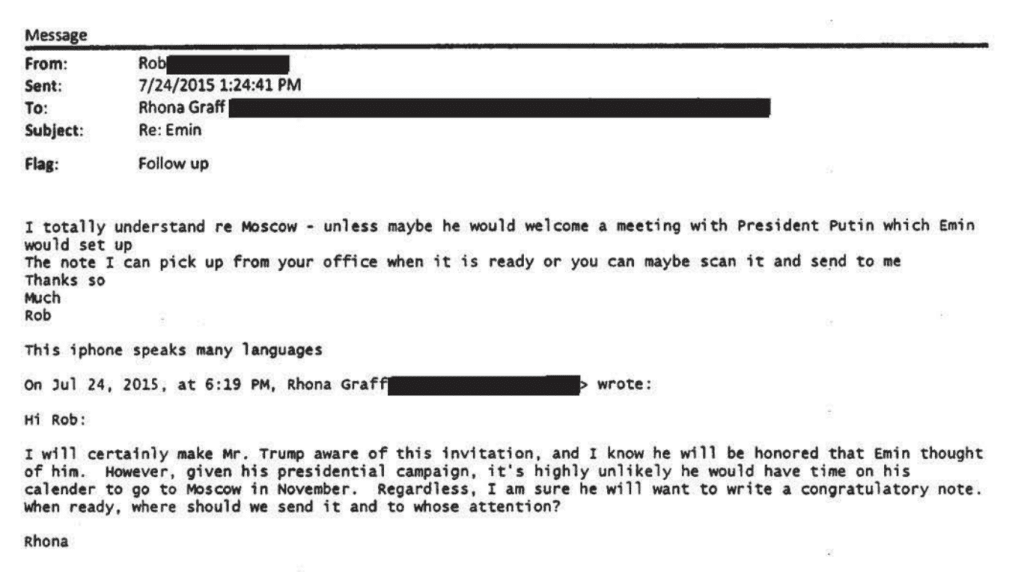
If Maxwell solicited a letter from Trump, she would have asked Trump’s assistant to get one for her, and Trump would have passed on the letter via the same assistant.
WSJ seems to have seen letters about letters. Which might explain why they’re not clear “how the letter with Trump’s signature was prepared,” but are sure that it came from him.
It isn’t clear how the letter with Trump’s signature was prepared.
Mind you, they’ve also seen the letters themselves — not just the Trump one, but letters from other famous people from whom WSJ solicited comment: Leslie Wexner and Alan Dershowitz.
The album had poems, photos and greetings from businesspeople, academics, Epstein’s former girlfriends and childhood pals, according to the documents reviewed by the Journal and people familiar with them. Among those who submitted letters were billionaire Leslie Wexner and attorney Alan Dershowitz.
[snip]
The longtime leader of Victoria’s Secret wrote a short message that said: “I wanted to get you what you want… so here it is….” After the text was a line drawing of what appeared to be a woman’s breasts. Wexner declined to comment through a spokesman. Wexner’s spokesman previously told the Journal that the retail mogul “severed all ties with Epstein in 2007 and never spoke with him again.”
Dershowitz’s letter included a mock-up of a “Vanity Unfair” magazine cover with mock headlines such as “Who was Jack the Ripper? Was it Jeffrey Epstein?” He joked that he had convinced the magazine to change the focus of an article from Epstein to Bill Clinton. Dershowitz, who represented Epstein after his first arrest, said, “It’s been a long time and I don’t recall the content of what I may have written.”
Wexner doesn’t want to talk about what documents might have once been in Epstein’s possession or might still be in Maxwell’s possession showing him joking about women with a sexual predator. Dershowitz, however, didn’t deny he sent a letter to Epstein laughing about framing Bill Clinton for something Epstein did, several years before Dershowitz would denigrate Epstein’s victims in a successful bid for a get out of jail free card for the abuser. He just claims not to remember that he was thinking of doing so before he actually had to help Epstein out of a terrible criminal jam.
I’ve read the WSJ article a bunch of times, and while they claim to have seen the letters (and possibly letters about letters), they don’t appear to claim they’ve seen the leather bound album itself. They are reporting on the existence of the album and the contents of the letters.
The existence of the album and the contents of the birthday letters haven’t previously been reported.
They know it was bound because several people involved in the process of getting it bound (this could be people both on Maxwell’s side and on Herbert Weitz’s team — he’s dead but his team might not be) told them who bound it.
The book was put together by a New York City bookbinder, Herbert Weitz, according to people who were involved in the process.
There’s one more thing about the album, something absolutely critical for understanding what is going on. Pages from the album were examined by DOJ officials back in 2019 and 2020, but WSJ has no idea whether they were part of the review Pam Bondi just did.
Pages from the leather-bound album—assembled before Epstein was first arrested in 2006—are among the documents examined by Justice Department officials who investigated Epstein and Maxwell years ago, according to people who have reviewed the pages. It’s unclear if any of the pages are part of the Trump administration’s recent review.
WSJ is certain they were in DOJ custody during the first Trump term. WSJ is not certain that those documents were among the ones Pam Bondi had 1,000 people review in 24-hour shifts before John Sauer kept delaying the decision about what to do about Maxwell’s appeal.
This doesn’t necessarily mean that WSJ has DOJ sources — or rather, former DOJ sources. It could be that witnesses were asked about the letters, which is how WSJ discovered they were in DOJ custody. But it’s worth noting that one of the prosecutors on both the Epstein and Maxwell prosecutions, Andrew Rohrbach, was among the people Emil Bove got fired for refusing to take part in Trump’s quid pro quo. Rohrbach isn’t the only one who’d be covered by that asymmetric protective order. Obviously, Maurene Comey, whom Trump fired the day after the interview with WSJ, would be too. But Rohrbach is one person who would know what prosecutors did in 2019, but probably not the review done in March. But then, so would a bunch of other people at SDNY if the Maxwell prosecution was one of the reasons Trump fired Geoffrey Berman.
With all that in mind, let me lay out something else.
This binder does not obviously show up in the inventory of things obtained in searches of Epstein’s various properties. Most of the binders included in the inventory contain CDs or photos, though item 1819 describes 10 binders, some of which may contain other things, and item 18140 is a bankers box with miscellaneous things. Nothing in the WSJ story says that DOJ had the binder itself.
It’s possible that DOJ obtained “pages from the leather-bound album” via email warrants targeting either Epstein or Maxwell, letters about letters.
But if those pages were obtained with a search warrant, they would not be covered by grand jury secrecy.
Moreover, nothing in either Epstein’s or Maxwell’s indictments would reflect testimony about the album. They rely on victim testimony, travel records, and phone records. And while Epstein’s indictment spans the same period — 2002 to 2005 — as the binder (which explains why DOJ would have obtained it), Maxwell’s indictment focuses on 1994 to 1997. If she got copies of the binder in discovery (and it’s not clear she would have), it would not have been central to her case.
The only other way this album would be covered by grand jury secrecy would be if it were subpoenaed. But wherever the album itself ended up by the time SDNY was investigating in 2018, it is extremely unlikely it was obtained via subpoena.
All of which is to say that it is virtually certain that Donald Trump instructed his defense attorney turned Deputy Attorney General, Todd Blanche (because Blanche has not updated his NY bar membership, he shows up in the docket under his firm identity, as if he’s a defense attorney who happens to represent the government in this issue), to go look for this letter in one place he’s pretty sure it never appeared, the grand jury.

When JD Vance tried to dispute the WSJ story by crying that WSJ hadn’t shown “us” the letter, there’s a decent chance he said that knowing that the signed copy of the letter remains safely in DOJ custody — precisely where Trump knows his attorneys won’t look for it.
Update: Added screencap of Rob Goldstone email.



